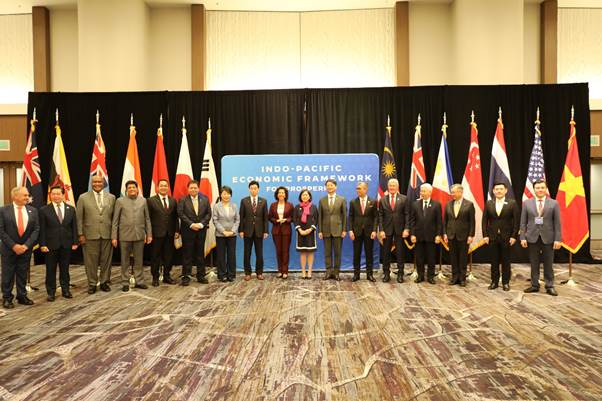Context:
Recently, India participated in the third Ministerial Meeting of the Indo-Pacific Economic Framework for Prosperity (IPEF).
More on the News
- The Union Commerce and Industry Minister along with 13 other IPEF Ministers virtually attended the third Ministerial meeting focused on IPEF Pillar II (Supply Chain Resilience), Pillar III (Clean Economy), and Pillar IV (Fair Economy).
- Members in the meeting discussed the building on the progress made by the Supply Chain Agreement’s three bodies, which met in July 2024 to elect leadership:
- Supply Chain Council: India was elected as Vice Chair of the Council with the US as Chair.
- Crisis Response Network: Korea as Chair and Japan as Vice Chair.
- Labor Rights Advisory Board (LRAB): the United States as Chair and Fiji as Vice Chair.
- The meeting was focused on critical sectors like semiconductors, critical minerals with a focus on batteries, and chemicals which are highly relevant
- The Meeting underscored the importance of resilient supply chains for Agro-Chemicals.
- According to an estimate, the Global Agrochemicals Market (fertilisers, pesticides, adjuvants, and plant regulators) is projected to reach USD 282.2 billion by 2028 from USD 235.2 billion by 2023, at a compound annual growth rate (CAGR) of 3.7%.
- IPEF’s focus on Logistics perfectly syncs with the Gati Shakti initiative which aims to improve logistics and transportation infrastructure across India.
- The IPEF partners welcomed the progress made on the eight Cooperative Work Programs (CWPs) under Pillar III, which serve as one of the primary mechanisms under the Clean Economy Agreement.
The eight CWPs are in the areas of:
- Regional hydrogen initiative (first CWP to be announced in May 2023)
- Carbon markets
- Clean Electricity
- Sustainable aviation fuels (SAF)
- Workforce development
- Emissions intensity accounting
- E-waste urban mining
- Small modular reactors (SMR)s.
About Indo-Pacific Economic Framework (IPEF)
- The IPEF, launched in May 2022, is a USA-led initiative and currently includes 14 partners.
- 14 partner countries – Australia, Brunei, Fiji, India, Indonesia, Japan, the Republic of Korea, Malaysia, New Zealand, Philippines, Singapore, Thailand, Vietnam and the USA.
- The framework is structured around four pillars:
- Pillar I – Fair & Resilient Trade
- Pillar II – Supply Chain Resilience
- Pillar III – Clean Economy
- Pillar IV – Fair Economy
- Through this initiative, the IPEF partners aim to contribute to cooperation, stability, prosperity, development, and peace within the Indo-Pacific region.
- India has joined Pillars II to IV of IPEF while it maintains an observer status in Pillar I.
- India joined Pillar II in November 2023, which has been in force since February 2024.
- Recently, during the Prime Minister’s visit to the USA, India joined Pillar III, Pillar IV, and the IPEF Overarching Agreement. These agreements will come into force in October 2024.
- The 14 IPEF partners represent 40 per cent of global Gross Domestic Product (GDP) and 28 per cent of global goods and services trade.
Also Read:
Karnataka has the Highest Suicide-related Economic Burden In The Country

